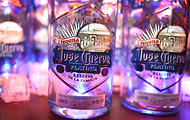 Donald Traill /AP Images for Jose Cuervo
Donald Traill /AP Images for Jose Cuervo
8:07 p.m. | Updated
LONDON — The British liquor company Diageo said on Tuesday that it had ended talks to take over the tequila brand Jose Cuervo after failing to agree on a deal with its owners.
Diageo, the maker of Smirnoff vodka and Johnnie Walker Scotch, will stop distributing Cuervo when an agreement with the tequila brand’s owners, the Beckmann family of Mexico, expires at the end of June after 27 years.
The two sides failed to agree on a price for the brand, which analysts had valued at about $3 billion, said a person with direct knowledge of the negotiations, who declined to be identified discussing private talks.
The breakdown of Diageo’s talks with the Beckmanns, who are heirs of the founding Cuervo family, is also likely to fuel speculation that Diageo might be interested in the Beam spirits group in the United States, which owns the tequila brand Sauza.
For now, Diageo said it would focus on developing its Don Julio tequila brand, which is smaller but aimed at a higher-end and faster-growing customer base than Jose Cuervo, according to the company.
Paul S. Walsh, Diageo’s chief executive, said in a statement that the future of Cuervo “would be best delivered by aligning ownership of the brand with its route to market, and I have no doubt that Diageo has the best route to market for this brand.
“However,” he continued, “it has not been possible to agree a transaction which delivers value for Diageo’s shareholders.”
Shares in Diageo fell 1.64 percent in London on Tuesday.
Diageo has been distributing Cuervo outside Mexico since 1986 in a deal that made up about 3 percent of Diageo’s group sales, or about £300 million ($481 million).
The end of the discussions is a setback for Diageo’s plan to expand in faster-growing markets outside Europe, including China, India and Latin America. The company bought a majority stake in United Spirits of India in November after years of negotiations with Vijay Mallya, the Indian tycoon whose family created the liquor brand.
Other makers of alcoholic beverages have been seeking to increase earnings abroad to make up for sluggish demand at home. Asia Pacific Breweries accepted a $4.6 billion bid from the Dutch brewer Heineken for a stake in the company in September. In June, Anheuser-Busch InBev took full control of Grupo Modelo of Mexico, the maker of Corona Extra beer.
Cuervo traces its roots to 1795, when José María Guadalupe de Cuervo received the first official permit from the king of Spain to make tequila. The drink is made from the blue agave plant.
Article source: http://dealbook.nytimes.com/2012/12/11/diageo-ends-talks-to-buy-jose-cuervo-brand/?partner=rss&emc=rss